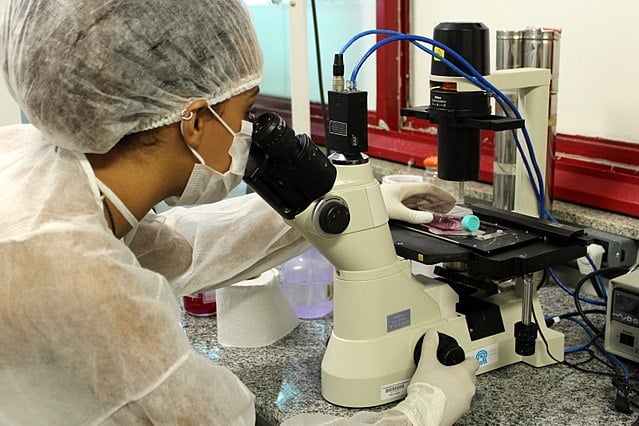Going to med school isn’t the only option for students with a biology degree. Many graduates find other ways to help people with their background knowledge, from treating diseases to sustaining the natural environment.
Biology encompasses the study of living things and is a popular choice for science-lovers. The coursework covers a variety of subjects from the molecular level to entire communities of organisms. Required courses include biology, anatomy, genetics, microbiology, and pharmacology, which provide fundamental knowledge across a variety of professions. Students have the opportunity of pursuing higher degrees for more specialization, but there are plenty of jobs that do not require expertise beyond a biology degree.
This understanding of living processes allows graduates to pursue careers such as research scientists, healthcare practitioners, technicians, educators, medical sales, and more. In addition, biology students understand how to design experiments and interpret results, a highly transferable skill that indicates an analytical mindset. In addition, they gain hands-on learning through laboratory classes and research opportunities. Many courses require report writing that teaches students clear and accurate communication.
According to the United States Bureau of Labor Statistics, there were nearly 3 million employees in the biology degree field in 2018. The field is growing quickly due to new advances in technology and an increased focus on protecting the environment.
The median salary for those holding a biology degree is $65,000.
Here are 10 amazing careers – with salaries revealed – for those with a degree in biology.
Microbiologist

Microbiologists study tiny organisms such as bacteria, viruses, and parasites to understand how they interact with their environments. This field has broad effects on today’s world, from vaccine development to creating new biofuels. A typical day in this job involves planning and executing complex experiments that focus on isolating and culturing microorganisms. Microbiologists study how these cultures affect their environment and vice versa.
Outside of the laboratory, microbiologists review literature, attend conferences, and publish technical papers to share their findings with the community. They also need to present relevant results to the rest of their company or the public. Microbiology is interdisciplinary, and workers often perform research alongside medical professionals to help prevent and treat diseases.
As a specialization of biology, microbiology is a vital field where groundbreaking research is being performed. Biology degrees are related to microbiology programs, especially if there is a focus on microbes, biochemistry, and cell biology. It is also essential for microbiologists to have laboratory experience, which many biology graduates have plenty of. Microbiologists make a median salary of $75,700 per year.
Biological Technician
Biological technicians work primarily in the laboratory where they run scientific experiments and obtain accurate results. Technicians are needed throughout various industries, including hospitals, medical schools, government agencies, and biotechnology companies. Along with performing biological experiments, they are responsible for documenting their results and analyzing data. With more and more discoveries in biological fields, the need for research technicians is projected to grow 7% over the next decade, faster than the national average for all occupations.
Outside of running experiments, biological technicians help perform other tasks such as maintaining laboratory equipment, preparing samples for analysis, and writing technical reports to summarize their findings. They use a variety of laboratory instruments to carry out daily tasks including more advanced robotics and automated devices.
Research technicians need a strong understanding of biological concepts and prior hands-on laboratory experience, making graduates with a biology degree a good fit. Many courses within a biology degree program include laboratory courses that teach the basics needed to be a biological technician. The median pay for biological technicians is $45,900 annually.
Wildlife Biologist
Wildlife biologists research how animals and how they interact with their ecosystems. They are responsible for limiting the influence that humans have on natural habitats and vice versa. Wildlife biologists can work with animals directly to check their level of health and tag them for later tracking. These workers also do applied work through the conservation and management of various animal populations.
Today, many wildlife biologists work with public officials to protect species from extinction through conservation plans. They implement programs to protect wild populations and prevent the spread of invasive species. To share their findings, wildlife biologists write papers, give reports, and present information to others in the field and the general public.
An undergraduate degree in biology with more specialized coursework in wildlife biology or ecology prepares graduates for a career in wildlife biology. They learn about critical technical topics from different animal populations to cellular biology. Wildlife biologists also need strong communication, problem-solving, and occasionally outdoor skills to excel. In 2019, the median pay for wildlife biologists was $63,300.
Biochemist
Biochemists are at the forefront of new discoveries in biotechnology and biomedical research. This includes a variety of topics surrounding the chemical principles of living things, from cell development to heredity to disease. They have the laboratory skills and technical know-how to design and perform experiments to help advance the field. Biochemists work in basic and applied research to expand knowledge about biological processes and to solve specific problems.
Outside of the lab, biochemists review literature, prepare technical reports, and attend conferences in the field. Biochemists present their findings to other team members and will also use their writing abilities to find funding sources.
Biologists use their fundamental knowledge of anatomy and physiology to understand how specific drugs will affect the body. This knowledge is crucial in biochemistry. Although most biochemists obtain higher-level degrees, bachelor’s and master’s degree holders can qualify for entry-level positions in the field. Biochemists earn a median salary of $94,500.
Marine Biologist
Marine biologists research the numerous plants and animals that live within the ocean. They perform calculations and experiments to ensure that the habitat and the creatures within it are healthy. All work follows the scientific method and requires problem-solving skills to determine what to do to restore the environment. Marine biologists can specialize in specific fields, including marine conservation, rehabilitation, or environmental cleanups.
The majority of experiments are conducted in laboratories with access to current industry technologies. However, marine biologists also perform fieldwork at sea by collecting samples or observing organisms from boats and submarines. They aim to research the behavior and relationships among marine creatures in their natural habitat.
Many marine biologists graduate with biology degrees, where they gain fundamental knowledge in ecology, chemistry, physics, and statistics. Graduates with a strong writing background will do well in marine biology due to the need for communicating with various regulatory bodies and other audiences. Marine biologists earn an average base salary of $52,400.
Forensic Scientist
Forensic scientists use their knowledge of natural science to solve crimes. They are responsible for gathering and analyzing biological material to use as evidence. Forensic scientists may work directly in the field or the laboratory, depending on their specific role. In the laboratory, they use techniques such as DNA analysis, toxicology, and digital analysis to investigate samples.
These workers also need to engage with the community to understand the current methodologies. Forensic scientists need to describe technical topics in a way that the general public can understand. Occasionally, they will be called to testify in court about their findings and need to be able to defend their methodology and conclusions.
Forensic scientists need to be detail-oriented, organized, and committed to justice. A technical background in biology is the starting point for success, with the strongest candidates having hands-on experience in the laboratory. In the United States, forensic scientists earn an average salary of $57,700.
Environmental Scientist
Environmental scientists use their background in biology to protect the environment and promote human health. They focus on cleaning up pollution, reducing waste, and assessing any threats to the planet. These scientists can work in the field to collect environmental samples or in a laboratory setting to analyze information and compile data.
Environmental scientists also help advise government bodies on policies and work with them to ensure compliance. They prepare technical reports and presentations that explain their solutions to the greater public. Some environmental scientists work for consulting firms that help various companies meet sustainable guidelines.
Positions in environmental science often do not require advanced degrees, with the exception of teaching and highest-level research. Although environmental science encompasses a wide range of natural sciences, a more focused degree such as biology provides specialized knowledge. Biology graduates understand how ecosystems work and factors influencing the environment and human health. The median pay for an environmental scientist in the United States is $71,400.
Agriculture and Food Scientist
Agriculture and food scientists find ways to maintain and expand the world’s food supply through research and development of new technologies. They ensure that our current agricultural establishments and products are safe and sustainable. In particular, agrarian scientists study soil composition and its relation to plant growth, whereas food scientists discover new food sources, packaging methods, and techniques for preservation.
Agricultural and food scientists spend most of their time studying data or running experiments in a laboratory or office setting. Occasionally, fieldwork brings them to various farms, processing plants, or production facilities. When visiting these sites, scientists ensure sanitary and efficient procedures are being followed.
Biology students are prime candidates to become agricultural and food scientists due to their foundational knowledge in biology, biochemistry, and plant physiology. This knowledge is essential to understand the biological processes through which livestock and crops grow. The median salary in this field was $65,200 annually in 2019.
Pharmaceutical Representative
Pharmaceutical representatives sell medicines to hospitals, clinics, and other medical institutions. They need a robust scientific understanding of how a new drug will affect patients. Chemistry, anatomy, and physiology are essential technical topics to be able to communicate to doctors and patients. By connecting providers with new treatments, they help healthcare providers bring life-saving medicines to the public.
Along with learning about their company’s products, pharmaceutical representatives must study competing drugs and how they differ in function and benefits. These workers acquire new customers through individual meetings, conferences, and other events. Due to the quickly growing pharmaceutical industry, there are always new medicines to research and promote.
Most pharmaceutical representatives study life sciences, including chemistry or biology, to understand how particular medicines work. They also need to be strong communicators to convey benefits and specific information about their products. Pharmaceutical sales representatives make an average total compensation of $150,000, due to high base salaries and additional commissions.
Science Writer
Science writers use their technical understanding of the sciences to create exciting and accurate pieces of work. They can write for journals, magazines, or other publications and cover a wide range of topics, including physical, chemical, or biological sciences. These writers must analyze data and accurately summarize results. Additionally, they are responsible for communicating complex technical topics in a way that the average reader can understand.
Science writers can work with a specific publication or as a freelancer. Along with solid writing abilities, they must be adept at communicating with a variety of sources. They interview scientists and other members of the community to understand the scientific processes at play.
A biology degree provides essential knowledge and experience with technical subjects that make topics easier to comprehend and write about. Employers generally favor writers who have a proven background in the subject. Communication skills are essential for conveying accurate and engaging information. Technical writers across all disciplines made an average salary of $77,000 in 2019.














